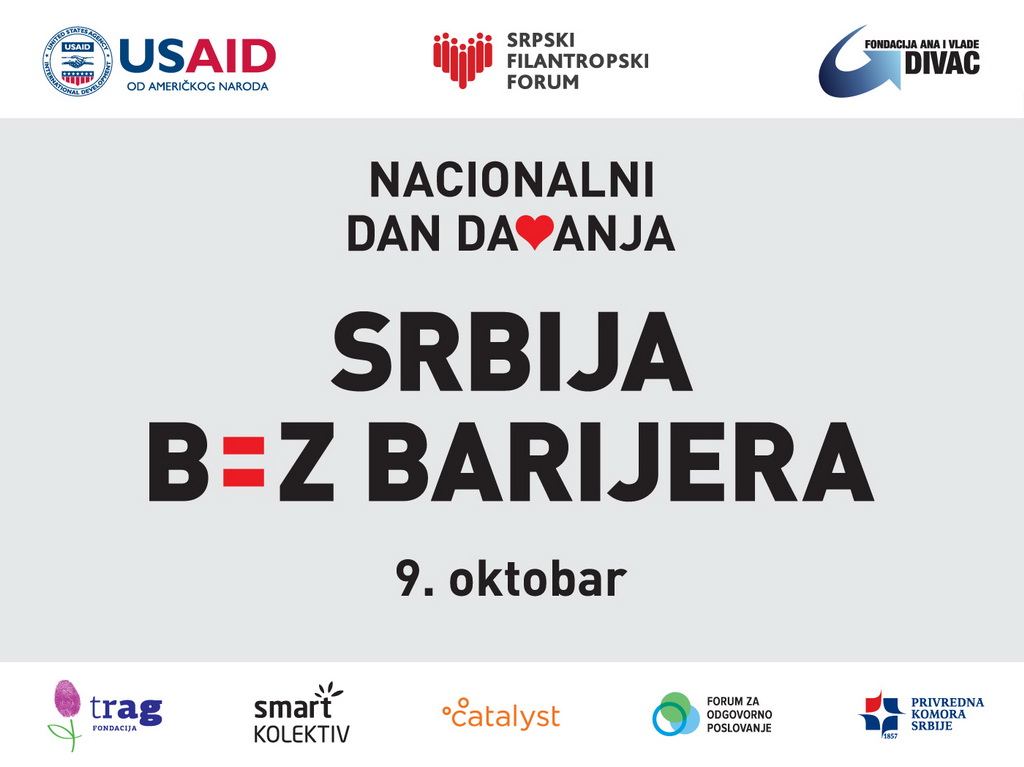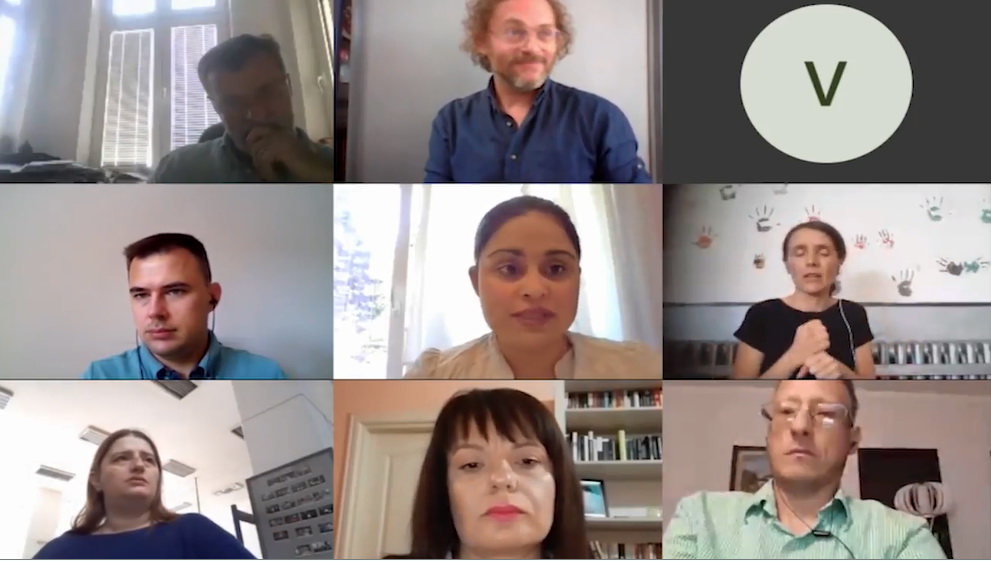 The online panel discussion titled “Serbia without Barriers”, held on 9 September 2020, marked the beginning of the Accessibility Awareness Month as a lead-up to the third National Day of Giving, celebrated on 9 October – the birthday of Mihailo Pupin, which is dedicated in this year to the promotion of all forms of accessibility for persons with disabilities in Serbia, as well as for society in general.
The online panel discussion titled “Serbia without Barriers”, held on 9 September 2020, marked the beginning of the Accessibility Awareness Month as a lead-up to the third National Day of Giving, celebrated on 9 October – the birthday of Mihailo Pupin, which is dedicated in this year to the promotion of all forms of accessibility for persons with disabilities in Serbia, as well as for society in general.
The National Day of Giving is a part of the “Framework for Giving” project funded by the United States Agency for International Development (USAID) and implemented by the Coalition for Giving, led by the “Ana and Vlade Divac Foundation”. Other Coalition members are the Trag Foundation, Catalyst Balkans, SMART Kolektiv, the Serbian Philanthropy Forum, the Responsible Business Forum and the Serbian Chamber of Commerce and Industry. Some of the activities within the National Day of Giving have been initiated and are conducted in cooperation with the Social Inclusion and Poverty Reduction Unit of the Government of the Republic of Serbia, as part of the “Support to Improve Social Inclusion in the Republic of Serbia” project, supported by the Government of Switzerland.
Under the slogan “Serbia without Barriers”, this year’s National Day of Giving is focused on the promotion of accessibility and, besides the general population, it is primarily dedicated to persons with disabilities, considering that one in four people are facing the problem of inaccessibility, as indicated by Ms Jelena Bratić from the Serbian Philanthropy Forum at the launch of the panel discussion. Ms Bratić also announced a series of activities that would be carried out in the period 9 September – 9 October, aimed at sensitizing the public about this issue and providing guidance for promoting all forms of accessibility in Serbia. The first discussion within the Accessibility Awareness Month was facilitated by Mr Mihailo Gordić, member of the Belgrade Association of Deaf and Hard of Hearing Persons.
Ms Jelena Avramović from the United States Agency for International Development (USAID) said that the inclusion of all people and the representation of their interests was one of the key priorities of USAID’s new five-year strategy. “The current pandemic has shown that we all have to rely on each other to ensure development in Serbia and at the global level. Therefore, we all must join our efforts, knowledge and resources in order to solve our common problems, including to ensure accessibility for all people”, said Ms Avramović.
The Serbian Philanthropy Forum has dedicated this year to supporting persons with disabilities in their efforts to eliminate barriers, as well as to strengthening the organisations and associations of persons with disabilities. “When making plans for activities, it is vital to take into account the attitudes and opinions of persons with disabilities”, said Mr Veran Matić from the Serbian Philanthropy Forum, emphasizing that it would be very important that the new Government of Serbia include persons with disabilities, in order to ensure their visibility and, as a consequence, empathy and wider social solidarity, as well as accessibility of institutions for persons with disabilities. As he explained, it is equally important to ensure the representation of persons with disabilities in local self-governments. “We have established the Committee for Supporting Persons with Disabilities, which will be permanently connected to the Serbian Philanthropy Forum”, said Mr Matić and stressed that, for cooperation with the state institutions in the upcoming period, it would be very important to establish an interpretation or contact centre for deaf and hard of hearing persons, which would be accessible 24/7.
 Ms Dragana Jovanović Arijas, Manager of the Social Inclusion and Poverty Reduction Unit of the Government of the Republic of Serbia, presented the results of the survey conducted by SIPRU with the idea to determine how the COVID-19 pandemic affected vulnerable groups in Serbia, including persons with disabilities. According to the survey findings, the measures in Serbia were not adequate in terms of the accessibility of services, information and financial/material support, while the majority of respondents stated that they had been mostly coping with the difficulties on their own from the beginning of the pandemic, or by relying on the support from their relatives, friends and neighbours. Ms Jovanović Arijas underlined the importance of the Law on the Planning System, which stipulates the obligation of ensuring a consultative process in the phase of preparation and public hearings with regard to policymaking at the national and local level. With that respect, she said that, in the preparation of the Strategy for the Improvement of the Position of Persons with Disabilities in the Republic of Serbia 2020–2024, which was adopted in March this year, civil society organisations were consulted in all stages, as well as that, in the future, it would be very important to include individuals with disabilities who are not necessarily linked to any organisations. As Ms Jovanović Arijas explained, there are many examples of good practices at the local level, such as the Municipality of Vračar; however, it is vital to bear in mind the significance of professional support in revising the technical and planning documentation prior to or during the reconstruction of buildings and, in that respect, it is important to enhance local self-government capacities.
Ms Dragana Jovanović Arijas, Manager of the Social Inclusion and Poverty Reduction Unit of the Government of the Republic of Serbia, presented the results of the survey conducted by SIPRU with the idea to determine how the COVID-19 pandemic affected vulnerable groups in Serbia, including persons with disabilities. According to the survey findings, the measures in Serbia were not adequate in terms of the accessibility of services, information and financial/material support, while the majority of respondents stated that they had been mostly coping with the difficulties on their own from the beginning of the pandemic, or by relying on the support from their relatives, friends and neighbours. Ms Jovanović Arijas underlined the importance of the Law on the Planning System, which stipulates the obligation of ensuring a consultative process in the phase of preparation and public hearings with regard to policymaking at the national and local level. With that respect, she said that, in the preparation of the Strategy for the Improvement of the Position of Persons with Disabilities in the Republic of Serbia 2020–2024, which was adopted in March this year, civil society organisations were consulted in all stages, as well as that, in the future, it would be very important to include individuals with disabilities who are not necessarily linked to any organisations. As Ms Jovanović Arijas explained, there are many examples of good practices at the local level, such as the Municipality of Vračar; however, it is vital to bear in mind the significance of professional support in revising the technical and planning documentation prior to or during the reconstruction of buildings and, in that respect, it is important to enhance local self-government capacities.
Ms Ljupka Mihajlovska stated that the newly established Serbian Accessibility Alliance perceived accessibility as an idea that should be part of the agenda of the whole society and all its members. “Accessibility should be considered in the context of the modern civilization assets because, for instance, the exclusion of any individual or group is much more expensive in the long run than their inclusion. Thus, some family members of persons with disabilities often have to waive their right to work in order to be able to devote themselves sufficiently to the disabled person, which, as a consequence, puts the entire family in the situation of financial insecurity or poverty”, said Mr Mihajlovska and concluded by saying that everything that can be accessed by persons with disabilities can also be accessed by everyone else, because a group consists of all its members, rather than only the majority of them.
Mr Vidan Danković from the Accessibility Audit Association stated that the normative framework in the Republic of Serbia did incorporate accessibility standards, but they have to be upgraded over time and we should continuously find ways to make the standards respond adequately to the new challenges that could not be foreseen in advance. “Organisations of persons with disabilities need to become much more involved and “Serbia without Barriers” brings together institutions and individuals and we can also see the consensus of political parties with that respect”, said Mr Danković and stressed the importance of providing support to local self-governments in the process of developing accessibility strategies. In conclusion, he said: “It is important to ensure an accessible chain of movement and to identify the standards of the design for all, which enables the development of a unique mechanism for the removal of barriers and full inclusion of persons with disabilities”.
Mr Ivan Novković, representative of the PONS Foundation, also stressed the importance of a comprehensive analysis of accessibility and presented the model of a mobile application that the PONS Foundation is developing in Niš, which could also be useful for other communities to achieve the highest possible level of safety in traffic. “The solution lies on multiple levels: one is the local self-government level, and another one envisages activities with the broader public, whose awareness needs to be raised in order to create a wider environment in which accessibility would be enabled for all”, said Mr Novković.
The conclusion of the discussion was that it was important to establish the key principles and standards of accessibility, based on the general principle of universal design. Accessibility should not be understood only as physical accessibility, but also as a set of accessibility aspects that should ensure that all areas and all services are equally accessible to everyone. Furthermore, the cooperation of all relevant stakeholders seems the be critically important, while all projects and activities focused on the achievement of accessibility should be made sustainable and based on good practices as much as possible.
 Government of the Republic of Serbia
Government of the Republic of Serbia















 pdf [271 KB]
pdf [271 KB]
Leave a Comment